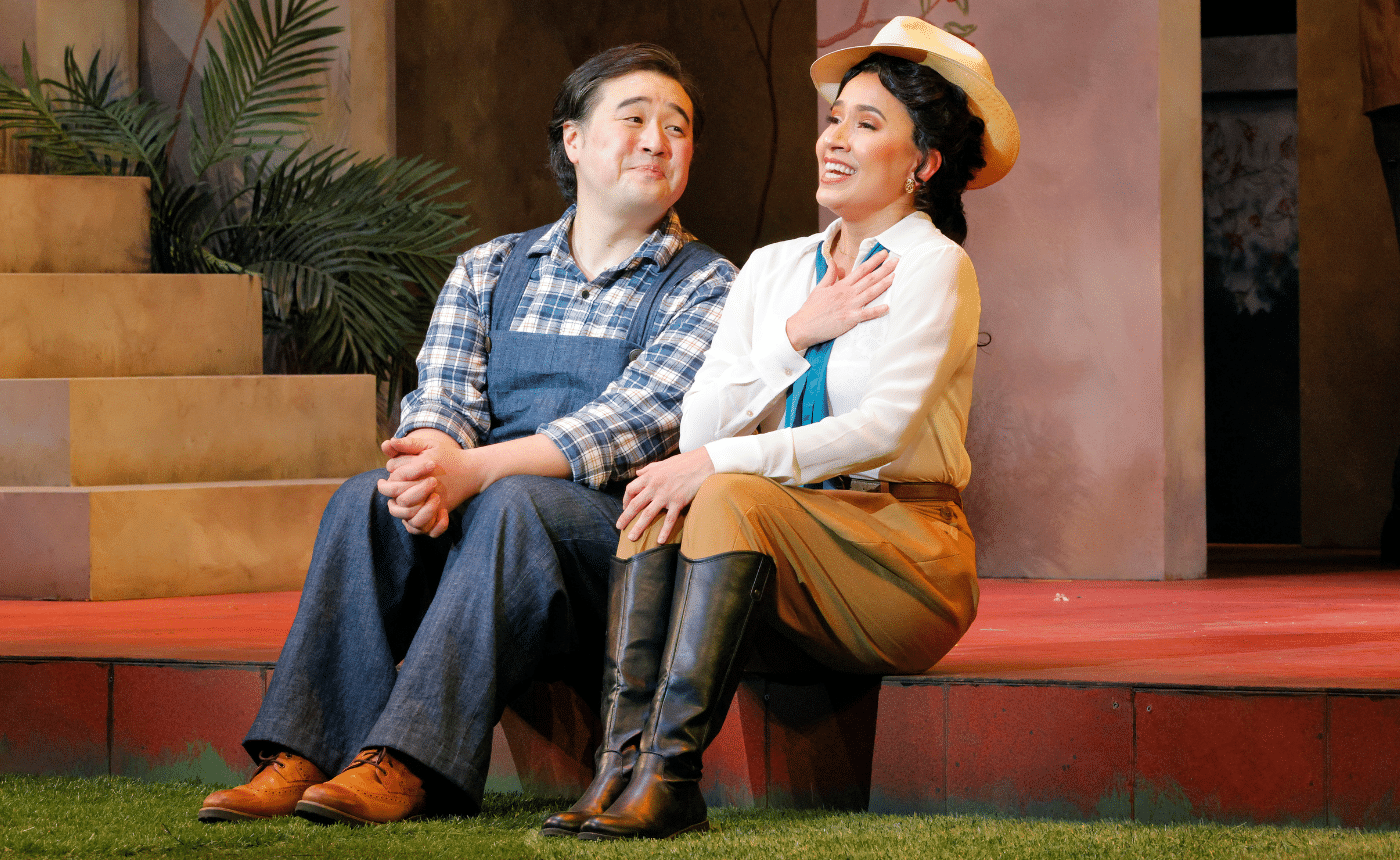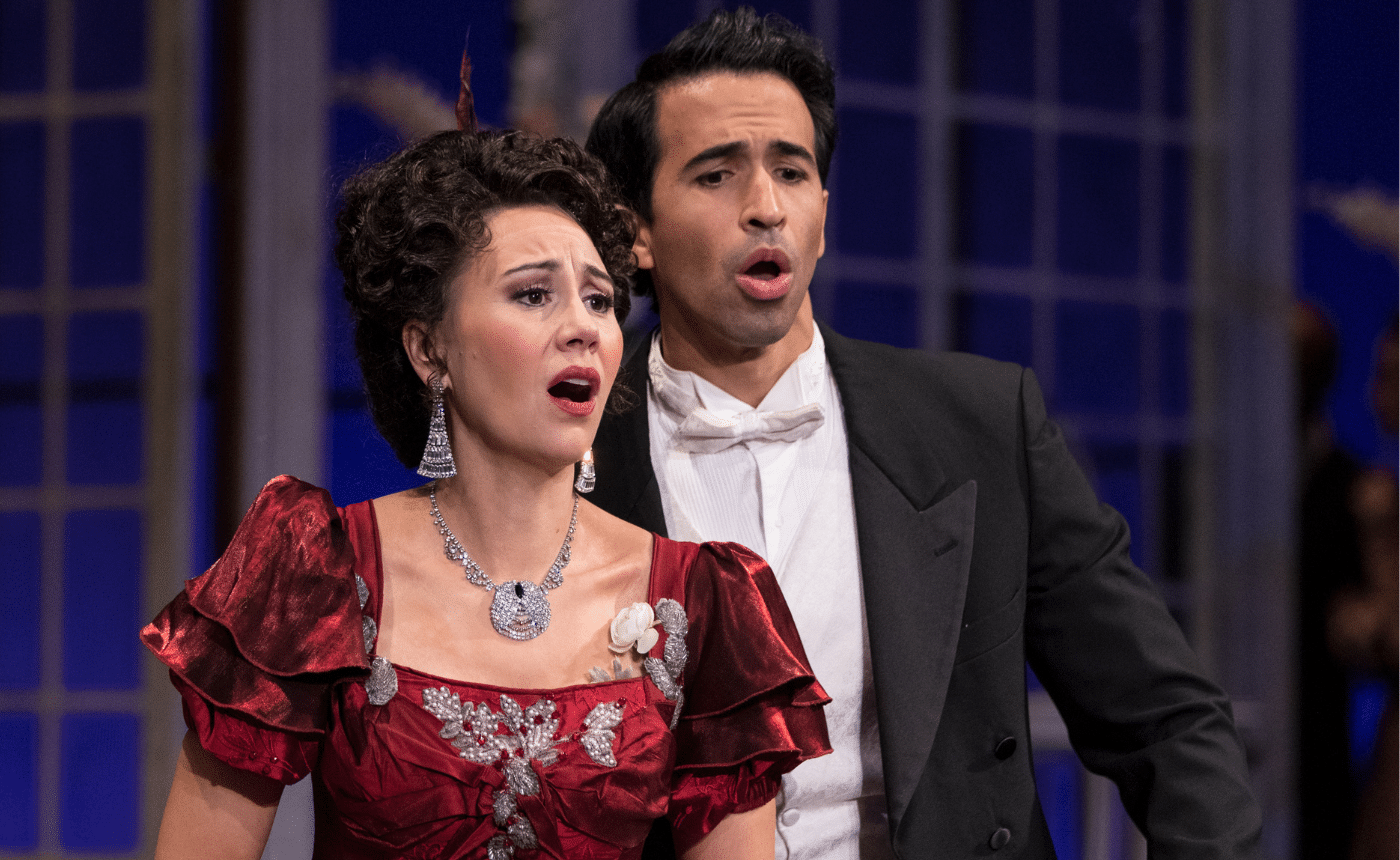One Last Laugh
by Paula Fowler
In many ways, Giuseppe Verdi’s final opera, 1893’s Falstaff, surprised his contemporaries. The Maestro had, after all, declared his retirement from opera composition after Aida’s premiere in 1871, with Rigoletto, La Traviata and nearly 30 other operas behind him. He had held true to that determination to compose no more operas for more than 14 years when, in the mid-1880s, an enticing libretto on a Shakespearean theme tempted him to take up his pen again. The result was the 1887 masterpiece, Otello. And then, amazingly, Verdi produced yet one more, Falstaff, five years later.
Some might think it strange for Italian, non-English-speaking Verdi to be attracted to these two stories based on Shakespearean plots, but Verdi had loved the works of the English Bard from his youth onward. In fact, he had already written an opera based on Macbeth (1847), and had toyed all his life with the idea of an opera based on King Lear.
Opera fans of Verdi’s day were also certainly taken aback to learn that the Maestro had turned in a new direction with Falstaff and had at long last taken on a comedy. All of his greatest works, Otello included, had been tragedies. One early work, Un Giorno di Regno (1840), had been a comedy, but that opera had flopped, and Verdi had avoided comic topics ever since. However, as critics now, post-Falstaff, have been quick to point out, Verdi’s wife and two children had all died during the composition period, and the commissioners of Un Giorno had refused to release him from their contract. Critics also refer to scenes in many of Verdi’s tragedies that scintillate with humor, illustrating his yet-unexplored capacity for comedy.
It was composer-librettist Arrigo Boito, thirty years Verdi’s junior, who enticed Verdi back to opera composition with his Otello libretto, and it was he who then lured Verdi to the topic of Falstaff. He suggested that septuagenarian Verdi would surprise the world with a final “might burst of laughter.” Verdi liked the idea and began work in 1890 on what he soon was calling the Big Belly Project. He wrote,
I’ve wanted to write a comic opera for forty years, and I’ve known The Merry Wives of Windsor for fifty…Boito has resolved all the ‘buts’ and has written for me a lyric comedy quite unlike any other. I’m enjoying myself.
Boito provided a masterful libretto, making a strong plot and compelling characters by combining elements from several Shakespeare plays in which the character Falstaff makes an appearance. His major source was the comedy The Merry Wives of Windsor, which, as legend has it, was the fulfillment of a request from Queen Elizabeth I, who had enjoyed Falstaff in his appearances in the Henry IV history plays, and requested a play about Falstaff in love. In the history plays, Falstaff is a witty philosopher-knave who hangs out in taverns entertaining his cronies and running up bills for capon and sack (chicken and wine). Shakespeare proposes, via The Merry Wives play, that a hedonist like Falstaff would “use” love as he did every opportunity in life: as a way to get money to feed his physical pleasures. So rather than actually falling in love, Falstaff speaks the words and acts out the gestures of love for pecuniary gain.
Most scholars agree that the Falstaff of Merry Wives falls short of the character in Shakespeare’s history plays. The Henry IV Falstaff is just as rotund and pleasure-seeking, to be sure, but he is also a good wit-sparring partner and foil for Prince Hal, and he seems to come out on top somehow, ever when he has dragged himself under. In contract to idealistic characters in the history plays, who seek personal honor on the battlefield, realist Falstaff speaks a soliloquy about “honor”:
Can honor set to a leg? No. Or an arm? No. Or take away the grief of a wound? No…what is honor? A word. What is in that word honor? What is that honor? Air…Who hath it? He that died o’ Wednesday.
When Prince Hal and Falstaff’s cohorts, for the sheer entertainment value, decide to trick Falstaff in order to enjoy his “incomprehensible lies,” hoping for “argument for a week, laughter for a month, and a good jest forever,” Falstaff is quickly able to see he’s been fooled, but can also concoct a way to take credit for the very trick they pulled on him. He claims “I am not only witty in myself but the cause that wit is in other men.”
Boito, for his Falstaff libretto, made superb choices, slimming the story so there is time for music by combining and shifting and deleting and muting this or that character, but keeping the basic stories of the original comedy: The main story concerns Falstaff, certain that his immensity is an aphrodisiac, writing identical love letters to two women in town, not realizing they are best friends. The women are married and have access to wealth—and that’s where he would like them to lead him. The women collude to put Falstaff to shame, and they do so—in two tricks rather than the original three of Shakespeare’s play. I applaud Boito’s choice in this deletion: fooling the man three times just seems mean, and makes Falstaff an ineducable sap.
Two sub-plots remain: Master Ford, the husband of one of the merry wives, has an awful temper, and he attempts, unsuccessfully, to pull his own ruse on Falstaff and on his wife. The women are just too clever, but they bring him into the fold to pull the final trick on the old jolly fool. The other sub-plot involves daughter Nannetta and the man she loves and wants to marry, Fenton. Her father does not approve, but the women help her out in the process of their final plot against Falstaff. Boito’s libretto scatters snatches of love scenes for the young couple throughout the opera, like “powdered sugar over a tart,” he explained. He also uses an Italian sonnet as text for Fenton’s aria in Act III, and a two-line refrain that the lovers share between them in their mini love scenes:
A kissed mouth doesn’t lose its freshness;
Rather, it renews itself like the moon.
Boito also pulled elements, including the Falstaff’s honor soliloquy, from the Henry IV plays, to bolster his title character. And he gives Falstaff the final word in the opera, which he does not get in Shakespeare’s comedy. In Merry Wives, Falstaff recognizes he has been fooled, and then just fades away as the focus turns to the weddings and what Master Ford has to say in his comeuppance. In the opera Falstaff, Boito pulls the great line about Falstaff’s being not only witty in himself, but the inspiration of wit in others. Falstaff not only gets the last word following that…everyone in the cast joins in with him, repeating and embellishing the truths he expounds: “we are all fools, and we all laugh at each other. But he laughs best who laughs last.”
What an opportunity for composition Boito gave Verdi at this point: to write music expressing and illustrating this theme. Verdi chose to use the opera buffa tradition of having the characters come downstage to sing the moral of the story. For their music he elected to write a fugue, a rare choice in opera, especially for voices. Falstaff introduces the theme, and then one by one other characters chime in, imitating and overlapping his tune. The result eventually sounds like cascading laughter, with titters encapsulated in staccato melodic triplets, and waves of laughter rolling loudly and then pianissimo, with silences as all the characters take a deep breath, and then bellow again. We hope you’ll want to laugh along!




